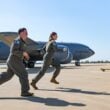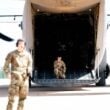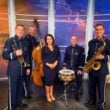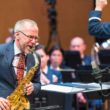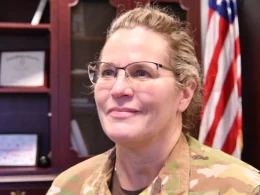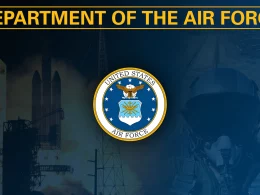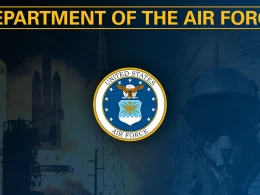JOINT BASE ANACOSTIA-BOLLING, D.C. —
One of the most rewarding parts of my job as a Singing Sergeant is to observe the reactions of our audiences while performing on stage. I have observed a World War II veteran and his wife sing along with us during a love song from our 1940s medley while gazing at each other. I have looked into the tearful eyes of a woman as she holds her small child and stands during her loved one’s service song from the United States Armed Forces. I have been overcome as I watched the French Air Chief listen fondly to music being performed in his native language. It is in these moments that I most humbly feel the power of music: how it reaches people of all ages and backgrounds, how it connects two people who may have nothing else in common, and how it can act as a foundation for building a relationship.
This past February, the Singing Sergeants had the opportunity to be featured at the American Choral Directors Association (ACDA) National Convention. This convention is held biannually in a different city around the country and it is a mecca for choir directors, singers, and music teachers. Convention attendees are able to see performances by choirs from around the world in featured concerts and workshops.
At this year’s ACDA convention, held in Kansas City, Missouri, the Singing Sergeants experienced some of the most enthusiastic audience reactions of their careers. During both nights of our performances in the Muriel Kauffman Theatre, the audiences were energetic and responsive. Despite performing in a large hall with bright stage lights, and where it is not always easy to personally connect with the individual audience members, some of the Singing Sergeants remarked about how much they could feel the energy of the audiences reacting to the music, and how the standing ovations at the end of each performance confirmed that connection.
Later in the week, we had the opportunity to perform for four of the ACDA Honors Choirs. Organized by age and gender, each ensemble exhibited an immense passion for music. We were able to not only perform for the students but also hear them perform. These aspiring young singers were filled with joy and were clearly excited to choose which song they would sing for us.
The Children’s Honor Choir brought many of the Singing Sergeants to tears. They sang about the vastness of the stars while playing small bells and looking up at the ceiling and walls as though they were gazing at celestial wonder.
The young women of the high school women’s chorus were ready to take the world by storm after they watched Technical Sgt. Stacey Holliday sing a solo verse of “Deep River.“ They were further empowered by Master Sgt. Mandi Harper’s virtuosic, atmospheric leaps during the song, “The Battle of Jericho.”
After the performance of “The Battle of Jericho,” my father, a retired choral conductor attending the conference, said, “I took a video of the end of the piece, not to capture your performance but to capture the screams from the high schoolers that I knew were going to follow!”
Overall, my favorite moment during the workshops was watching the reactions of the high school men as Technical Sgt. Matt Scollin performed a solo. They were visibly in awe, and it was obvious that many of them had never heard a voice with so much power, warmth, and depth of emotion before. I stood, thinking about how our country’s future is so bright because of these deeply passionate, open, and dedicated young people. I hope I never forget that moment.
Throughout the life of a military singer, there are certain songs that become foundational in your performances. For the Singing Sergeants, many of these works are obvious: “The Star-Spangled Banner,” the songs of the Armed Services, and “God Bless America,” among many others.
One song that is less known outside of that category is titled, “Freedom Song.” It is a song based on a poem that was written in response to the terrorist attacks of 9/11. It describes how that day changed our country and made us a more united nation, strong in the fact that nothing could take away our freedom. The song builds beautifully from beginning to end with the entire group singing, “I believe every step that I take is my freedom that you can’t take away.”
While performing that piece at this year’s ACDA convention, we were reminded of how powerful an impact this song could make on listeners. We performed it directly to the audience, without conductors, without any visual or emotional barriers. We all felt the energy of this compelling moment on stage.
Over the next few days as we spoke to conference attendees at our publicity booth in the exhibit hall, it became clear that this power was felt by the individual audience members as well. Time and time again, people came up to our booth specifically to comment on that song and how it made them feel. For some people who weren’t even alive when the terrorist attacks occurred, the song still touched them. They stated they had an understanding of how the text communicated our American spirit and identity.
One of our major responsibilities as Singing Sergeants is to serve as musical ambassadors to visiting leaders, both military and civilian, from foreign countries. We had the same pleasure of interaction with singers and directors from all around the world at ACDA. We met visitors from Italy, China, and Germany. One of the concerts on which we performed was an internationally-themed event entitled, “Community of the World Concert,” and featured choirs from Slovenia, Kenya, and Korea.
The Singing Sergeants present approximately 200 performances annually. We often perform for military members or groups that may be familiar with the military. On our community relations tours across the country, we reach some Americans who may not be as familiar with the military, but even at those concerts we can count on a high percentage of veterans and military families in the audience.
At ACDA, while some of the choral directors, teachers and honor choir students grew up in or currently live in a military family, we once again had the honor to be able to introduce so many Americans for the first time to the uniform in such a powerful way.
The flight chief of the Singing Sergeants, Chief Master Sgt. Ryan Carson, often reminds us that on any given day, we may be a person’s first and only interaction with the uniform, and that presenting a dynamic first impression is one of the greatest responsibilities we have as members of the Armed Forces.
I have been a professional singer for more than 20 years. My treasured teachers and mentors have instilled in me the idea that the most vital aspect of music is connection. As musicians, we spend decades honing our craft, working toward a technical perfection that is impossible to ever fully achieve. However, that technical prowess is just a vehicle for the communication that transcends words.
An airplane is a marvel of science that people 150 years ago could only imagine, but the real beauty of air travel is where that plane can take you, including the new sights, experiences and people you might encounter. Music achieves the same result without anyone ever needing to leave the ground. It connects people to other people, no matter how different they may seem; to new ideas and cultures; to a depth of their own emotion they may not ever take the time to experience in their daily lives. This is the power of music.


